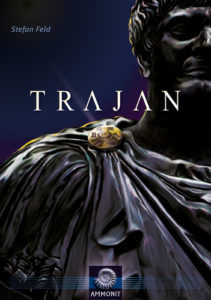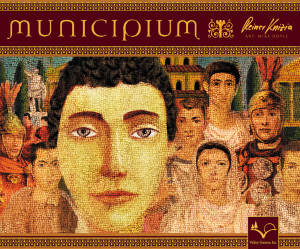- Learning time
- 60 minutes
- First play time
- 120 minutes
In the Shadow of the Emperor
Designed by: Ralf Burkert
In the Shadow of the Emperor is set during the Roman empire, and players represent families seeking to gain power through a series of electorates. There are seven in total, and in order to gain power you place a baron, knight, or castle (or a combination of them) into the electorate in question. When a round is over – when every player has passed – a player with the majority in an electorate takes power, and moves one of their barons into the seat of authority. Gaining a seat gets you two things: victory points, which are obviously crucial to winning the game; and a vote on the election for Emperor.
One player will start as Emperor, but at the end of each of the five rounds there will usually be a challenger, as another player can effectively end their turn by taking the Challenger card, that announces them as the Emperor-elect. If they can get the support from the ‘neutral’ players they will become Emperor. In an Emperor election whoever votes for the winning side (votes are revealed simultaneously) gets a victory point, and in a game where 20-30 victory points can mean victory, this can mean tactical voting!
The benefit of being Emperor is victory points, plus the ability to decide ties in the electorate.
As well as adding barons, castles or knights on your turn you can also take cards that allow you to move them around, from one electorate to another. You can oust knights from the board, gain extra votes for when the election arrives, and deliberately age or even kill off barons! If the nefarious politicking wasn’t enough, all your barons will age during each turn – they start at a relatively innocent 15, but will turn 25, 35, 45 over subsequent rounds before dying off and leaving the board. But the Doctor card can be either used to reverse this process (on your own baron) or accelerate it (on someone else’s).
As well as all that, your choice of cards during the round will dictate whether you give birth to a son or a daughter at the start of the next round. A majority of blue cards give you a son, a majority or equal amount of pink gives you a daughter. Such is the brutal and misogynistic ways of the Empire, whilst sons give you a new baron, daughters are either married off or sent to the convent.
Marrying a daughter off means offering her to another player. If they accept, they can flip one of their baron pieces in an electorate and turn it into a couple, doubling its power. In return you get one victory point. If they refuse, your daughter goes off to the convent and you get one money.
Couples in electorates have double the power of a single baron, but beware! They cannot rise to the electorate seat itself – you need a single baron in the electorate as well to achieve this.
Play continues over 5 rounds, and the player with most points at the end wins the game.
The guru's verdict
-
Take That!
Take That!
There may not be any combat, but the whole of In The Shadow of the Emperor represents a kind of war, with a series of mini-battles going on within it.
-
Fidget Factor!
Fidget Factor!
Not a huge amount, because when it isn't your turn you need to be watching what the other players are doing.
-
Brain Burn!
Brain Burn!
It can be quite thinky, with pauses as people work out their best move.
-
Again Again!
Again Again!
Although there are no randomising factors, no two games will be the same as the slightest deviation in one players' strategy can change everything.











Sam says
For me In The Shadow of the Emperor is a game that just has a little too much going on. There's a whole bunch of clever stuff in it, and I particularly like the 'ageing' mechanic, whereby each of your family members have a limited amount of effectiveness before they shuffle off this mortal coil. But the overall impression was of a rather complicated jigsaw - players who like a heavy 'cognitive load' will get a kick out of it though, especially if they like combative play. Almost every move in the game feels like a thrust in an ongoing multiplayer sword-fight.